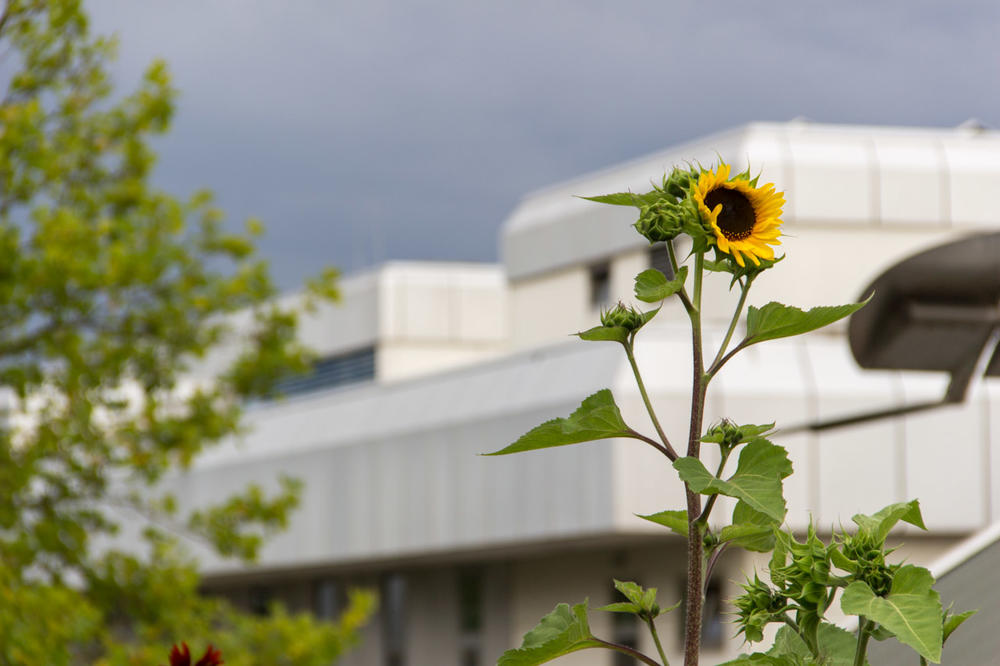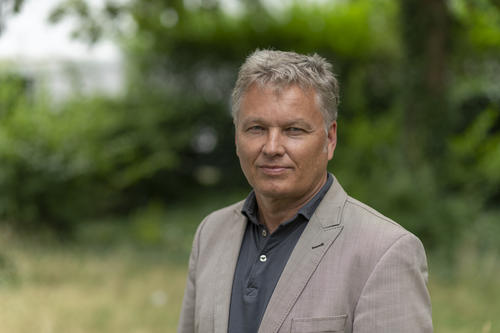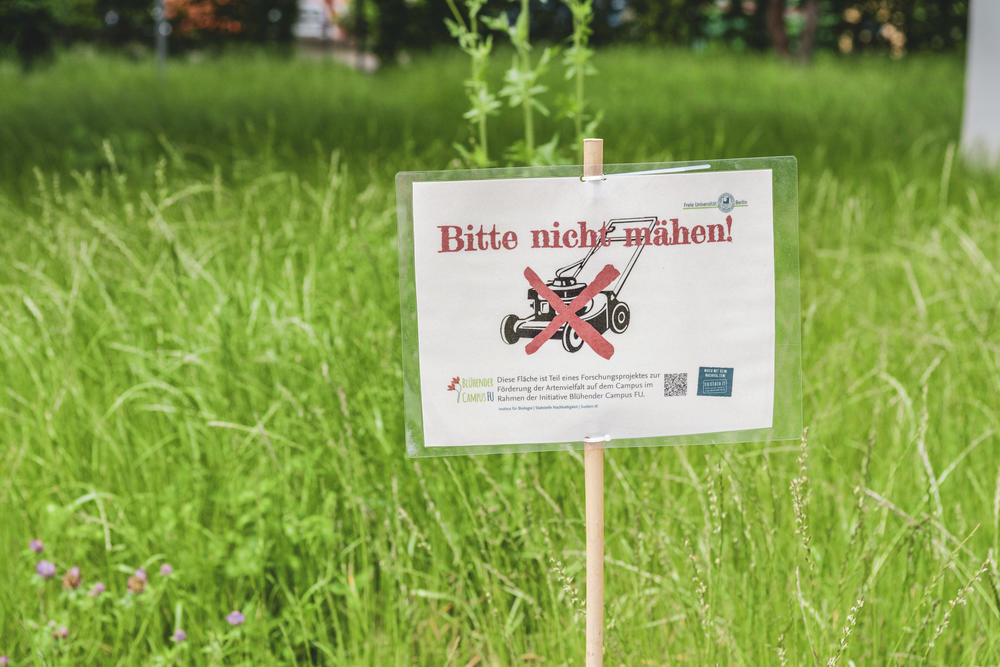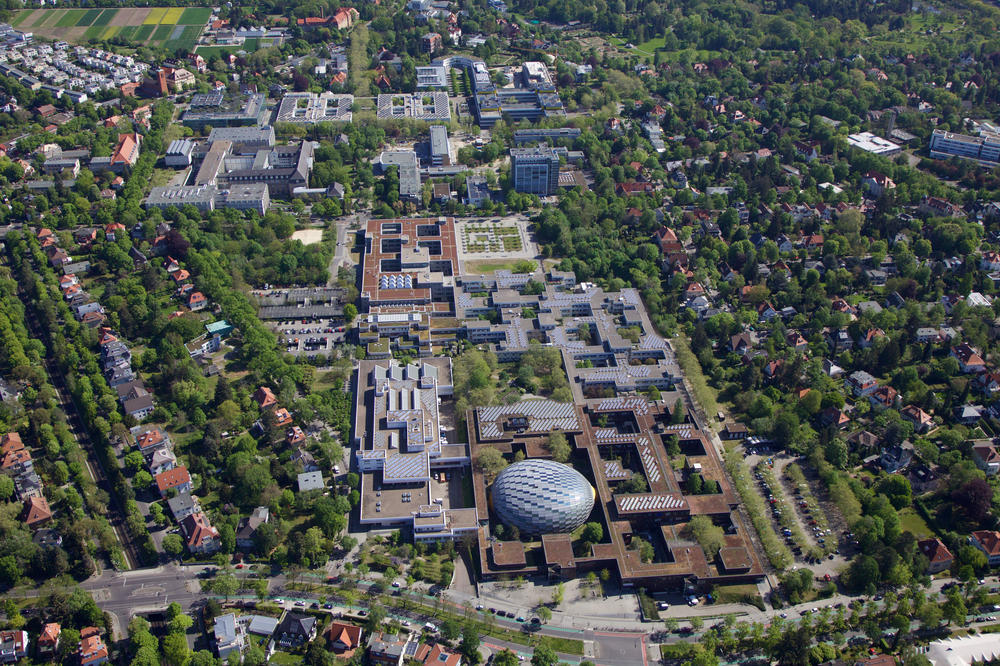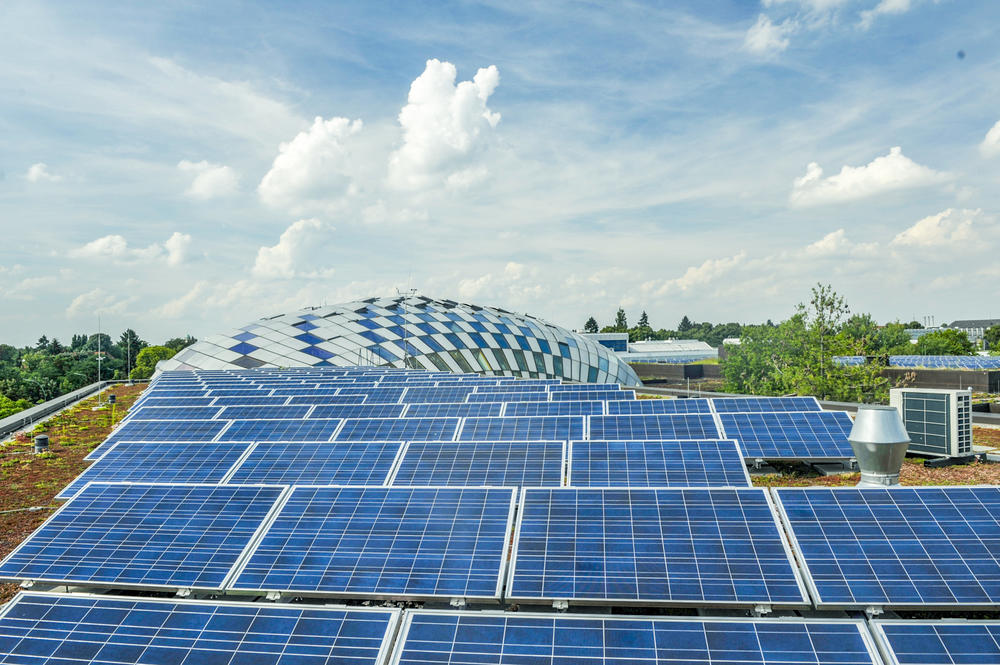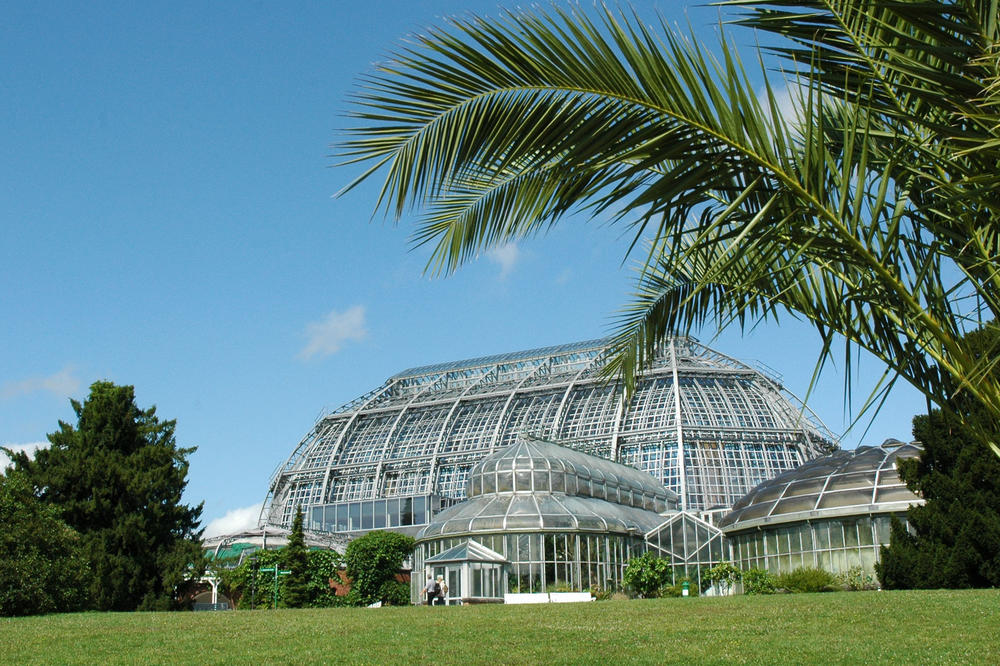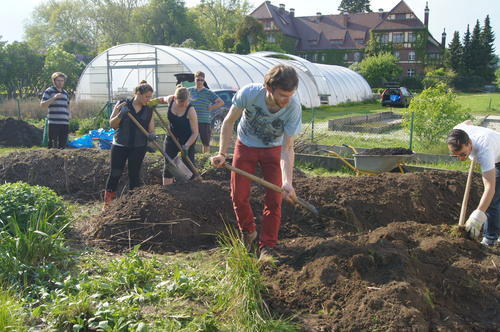“We can only make progress on sustainability if we work together”
Andreas Wanke, Head of the Sustainability and Energy Management Unit, talks about Freie Universität as it moves toward greater sustainability
Sep 19, 2019
In 2001 Freie Universität Berlin introduced an extensive energy management plan – with big savings that helped free up other university funds and helped protect the climate.
Image Credit: Freie Universität Berlin
The “Fridays for Future” initiative has called for a Global Climate Strike on September 20 to coincide with the UN summit next week in New York, which will focus on climate protection. The climate action package agreed upon by the German government’s “climate cabinet” will also be revealed at some point during the day on Friday.
Freie Universität Berlin has a tradition of actively participating in climate protection. As early as 2001, it launched an extensive energy management program, which has since led to a 40 percent reduction in CO2. Andreas Wanke, Head of the Sustainability and Energy Management Unit, talks about the steps Freie Universität has already taken and still plans to take on the path to becoming a sustainable university.
Mr. Wanke, the “Fridays for Future” initiative has called for a global climate strike on September 20. Did it take this movement among children and young adults to call attention to the need to protect the environment and the climate?
It speaks to the strength and the great merit of Fridays for Future that this movement has pushed the subject of climate protection into the center of social and political debates so vehemently and successfully. The young activists’ message is that the time available to really correct climate policy has narrowed significantly, and that’s why action is needed now. Their stance should definitely be taken seriously, since it is founded on scientific findings. It’s our job to pick up on that impetus.
What can a university do to help protect the climate?
Through its research projects, Freie Universität can point out ways to resolve the root causes and consequences of climate change. For example, researchers are studying how to halt the decline in biodiversity, developing grains that are more resistant to drought stress, creating climate models, and contributing to reports published by the United Nations’ Intergovernmental Panel on Climate Change.
Andreas Wanke, Head of the Sustainability and Energy Management Unit
Image Credit: Bernd Wannenmacher
Researchers at the Environmental Policy Research Center deal with energy policy, for example, and with the potential benefits of ecological modernization. I should mention that the center was founded in 1986, three days before the Chernobyl nuclear disaster. All at once, it became clear that environmental research does in fact have to do with the survival of humanity. And that’s just what the young people who are protesting are pointing out: It’s their future that is at stake. Here at Freie Universität, we are educating the young generation. Our job is not just to convey scientific knowledge about the causes behind these problems, but also to cultivate the professional and social skills needed to solve them.
Is sustainability explicitly a part of the curriculum?
Our researchers do include sustainability-related topics in their seminars and lectures, of course. When we took stock two years ago, we found that about 30 percent of all research projects and 15 percent of courses include aspects related to sustainable development. And a year ago, we introduced specific course content at Freie Universität, when the subject of sustainable development was made an integral component of the general professional skills courses that undergraduates are required to take.
We offer eight seminars per semester, accompanied by a lecture series. In the first two semesters, the seminars were attended by about 200 students, who could then go on to forge a connection, through the subject of sustainability, to the working world. The university is also open as a location for research. For example, students looked at the question of how to improve the management of green spaces around the university with an eye to ecological aspects.
The newly launched “Blühender Campus” (Blossoming Campus) project aims to cultivate greater biodiversity in the green areas at Freie Universität.
Image Credit: Sören Maahs
The university is also open to the outside world through activities such as the Schools @ University for Sustainability + Climate Protection program, which holds events twice a year. Schoolchildren come to the lecture halls and seminar rooms on campus, the Botanic Garden, dining halls, and the weather station to learn all about sustainability and climate protection, and teachers can participate in special educational training on the topics.
So at Freie Universität, environmental protection and sustainability are more than just subjects of research and study?
That’s right. In terms of what we can do to protect the climate overall, we believe a university should serve as an example through its own actions and show what is possible. In the past, we have focused on energy efficiency. By now, we have four cogeneration plants, generating both heat and power, and nine solar power systems.
Through various energy-saving measures started in 2001, Freie Universität was able to reduce its energy use over ten years by 25 percent.
Image Credit: Dirk Laubner
The nine photovoltaic systems installed on roofs across campus also help conserve energy.
Image Credit: Bernd Wannenmacher
Thanks to a mix of different measures, we managed to reduce our energy consumption by 25 percent over a ten-year period starting in 2001. It got harder after that, but after another seven years, we had achieved another three percent reduction. These results put us in a leading position among German universities. By conserving energy, we also lowered our carbon dioxide emissions. The campus now produces 39 percent less of this gas, which is harmful to the climate, than it did in 2001.
That sounds like climate protection is most successful when it is pursued by technical experts.
At Freie Universität, technical retrofitting of our buildings was only the starting point for further activities, and a lot of people were involved even at that early stage. The only way to achieve success in terms of sustainability is if as many units and members of the university community as possible are involved. I should mention that we started actively managing energy in the first place and subsequently developed the topic of sustainability as a response to a specific problem: the massive cost pressure that was still weighing on the university after budget cuts by the state of Berlin in the 1990s.
Every part of the university was studied to see where we could cut costs. One thing that is especially persuasive is that if I renovate a building today, I can see the impact as early as the next winter. And it’s easily quantifiable, too: In 2018, we used about 45 million kilowatt-hours less than in 2000/2001. At current energy rates, that works out to 4.4 million euros in savings a year. For the past 12 years, the departments have had a stake in this success, as half of the energy savings achieved is allocated to their budgets.
After that initial starting point with the technical retrofits, what else has been going on at Freie Universität over the past 18 years regarding sustainability?
We’ve managed to bring the subject of sustainability front and center at the university. Many members of the university community, from employees to students, would like to get involved with the issue and feel that the best place for them to have an impact is where they spend a lot of time. It is also an opportunity for people from different areas of the university to get to know each other and see how others go about their work here or what perspectives they have.
The Sustainability and Energy Management Unit, which is directly subordinate to the university management, was founded in 2015. This gives us a way to work on the subject of sustainability at the university at a level of complexity that isn’t possible at other higher education institutions in Germany.
How can members of the university community contribute?
There are opportunities across all areas of the university – research, teaching, knowledge transfer, administration, and on campus. The unit acts as a point of contact for everyone. One good example is the SUSTAIN IT! Initiative, which was launched by students and employees in 2010. Every year, the initiative organizes a sustainability week, which involves a number of workshops, art exhibits, and hands-on tutorials on things like repurposing old clothes or bike repairs. A food sharing point on campus lets people donate and share food.
On the grounds of the Botanic Garden, students working on the “UniGardening” project showed...
Image Credit: Freie Universität Berlin
... how even with very limited space it is possible to grow produce. The project was developed as part of a seminar on knowledge and activism at the Otto Suhr Institute.
Image Credit: Karola Braun-Wanke
The “Uni Gardening” project is another example. Students and employees use 500 square meters of space to grow vegetables and herbs at the Botanic Garden of Freie Universität.
You mentioned that these kinds of initiatives bring people together. How do you, as a unit, engage in dialogue with others?
We have an extensive network, which is crucial when it comes to developing ideas. One example is our “University Alliance for Sustainability.” It was founded in 2015 and encompasses our partner universities in Jerusalem, Saint Petersburg, Beijing, and Vancouver. Within the alliance, we share best practices and approaches and invite other higher education institutions worldwide to do the same through our international “Spring Campus” conferences.
The “Hoch-N” [to the N-th power] project is another example. It brings various higher education institutions in Germany together in groups to work on topics related to sustainability. One new activity is the U7+ initiative, which traces back to an initiative launched by the President of France Emmanuel Macron and to an invitation from French universities. In this program, 47 universities – Freie Universität Berlin among them – have pledged to strengthen the subject of climate protection in teaching and around their campuses. We are already working on both, but it’s an ongoing process.
International cooperation is associated with travel, frequently by plane – that’s not good for the atmosphere.
Research is unthinkable without personal exchanges, and sustainability research is no exception. Our cooperative initiatives, for example through the University Alliance for Sustainability, do lead to air travel. That’s a conflict of objectives, and we see that as a challenge. We need to think more about whether everything really has to take place in one spot at conferences. Is it really necessary for someone to travel there to give a single keynote address, or could that talk be arranged by video?
We currently operate 12 rooms for virtual communication at Freie Universität. We need to raise awareness of these options in the university community, through announcements and more targeted technical support services. That will be the only way to make people more willing to use these rooms – and, possibly, cut down on travel as a result.
Should people avoid flying in general?
That definitely wouldn’t work. Science, research, and scholarly endeavors rely on international cooperation. We and our partners in the University Alliance for Sustainability are currently conducting a systematic study to see what kinds of business trips are being taken and the reasons for choosing a given mode of transportation.
In the medium term, our goal is to develop a plan for work-related travel that helps to protect the climate. And we also have plans to make mobility on campus more ecofriendly, by designing the infrastructure to encourage walking and biking for example. All that is intended as part of a comprehensive mobility strategy for the university whose details are currently being worked out.
If you had a crystal ball, would you say “Fridays for Future” will still exist 20 years from now?
Climate protection and sustainability will still be on the political agenda in 20 years, I’m sure of it. But hopefully by then it won’t take a protest by the young generation to increase the pressure.
Kerrin Zielke conducted the interview.
The interview originally appeared in German in the campus.leben online magazine published by Freie Universität Berlin.

